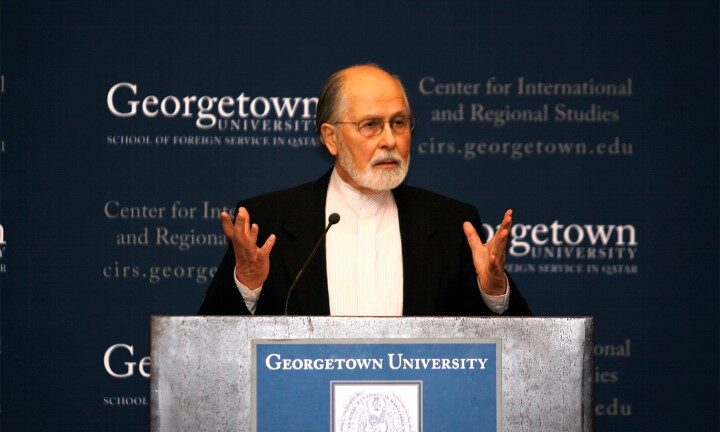Dialogue Series, Environmental Studies, Regional Studies
Seyyed Hossein Nasr on Islam and the Preservation of the Natural Environment

On January 26, 2009, CIRS began its Spring semester FacultyDistinguished Lecture Series with a talk by Seyyed Hossein Nasr, one of the foremost scholars of Islamic, Religious and Comparative Studies in the world. He was introduced to the audience by Mohammed Al Sudairi, SFS-Qatar sophomore and President of the Blue and Gray theater club.
Nasr’s lecture, held at the Al Sharq hotel in Doha, outlined daily environmental struggles within an elaborate frame of spiritual Islam. This subject, Nasr emphasized, “is of gravest importance” because people have resorted to covering up the problem without actually finding a solution. Environmental destruction however, “will not be solved by cosmetics,” but “requires a change in our way of life.”
Nasr noted the irony of human mastery over nature by warning that “to dominate nature is to destroy ourselves” in the process. He also said that there is no issue that should be higher on the world’s agenda, as other peripheral economic and political problems pale in comparison to the environmental crisis. Should the problem of degradation continue at its current rate, no other problem would even exist.
The main problem, Nasr stated, is that Muslims, although passionate about performing their religious duties, do not translate this into a greater awareness of their surrounding environments. This results in what he describes as a “disconnect” between the strength of Muslim faith and the way people’s daily actions and activates do not live up to Islamic principles. This, he argued, is because of the prominence of scientism as the singular most important principle of the modern world.
Initially, scientism became popular in the Muslim world as a means of combating colonialism and saving Islam from the onslaught of the West. This was done by mastering Western schools of thought and combining it with the principles of Islam. During this period, the Muslim world followed the basic assumptions of positivism; “the humanities were cast aside as insignificant” and “there was no intellectual resistance” to the West.
The Muslim world has become enslaved to the technological aspirations of the West and one common denominator, he noted, is that Muslims worship modern technology and science, which is falsely considered to be encouraged by Islam. Not only that, he said, but these modernized Muslims believe that the West will also take care of any problems that arise from technological developments.
The solution, according to Nasr, is to keep in mind that ultimately, God is nature and the environment. The question of Islam is integral to the environment as it is the connection humans have to the divine. Religious teaching, Nasr said, is paramount for human survival as it informs people about how to be respectful of their natural environments and how to honor every living creature, of which we are just one species. “Every creature has its rights, independent of humans” and he emphasized that we cannot overlook them. To reverse the current crisis, he said, it is imperative that we consider nature sacred.
Nasr concluded on the note that the populations of the Gulf region have an especially important task of conserving the endangered underwater coral reefs in the area. Coral reefs are one of the most fragile ecological life-forms in the world and, yet, are also one of the most instrumental in sustaining the environment.
Earlier in the day, Nasr was invited to visit the SFS-Qatar campus and to have an informal lunch- time discussion with SFS-Qatar Faculty and staff.
Summary by CIRS Intern Assma Al-Adawi and CIRS Publications Coordinator Suzi Mirgani.
Seyyed Hossein Nasr, currently University Professor of Islamic Studies at the George Washington University, Washington D.C., is one of the most important and foremost scholars of Islamic, Religious and Comparative Studies in the world today. Author of over fifty books and five hundred articles which have been translated into several major Islamic, European and Asian languages, Professor Nasr is a well known and highly respected intellectual figure both in the West and the Islamic world.